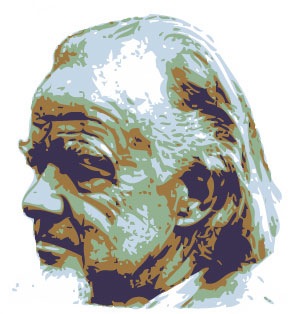Johannes hat in seinem Kommentar auf ein Phänomen hingewiesen, dass vielen Francis Schaeffer-Lesern vertraut sein dürfte: Schaeffer und manch andere Mitarbeiter von L’abri haben es häufig nicht geschafft, von ihnen verarbeitete Quellen genau zu kennzeichnen. Schaeffer war an diesem Punkt, bedingt auch durch Überlastung, nachlässig.
Johannes erwähnt ein Zitat, dass Francis Schaeffer Luther zugeschrieben hat. Es lautet (Francis Schaeffer, Gott ist keine Illusion, Wuppertal: Brockhaus, 3. Aufl., 1974, S. 14):
Wenn ich mit lauter Stimme und klarer Auslegung alle Teile der Wahrheit Gottes verkündige, außer gerade dem einen kleinen Punkt, den die Welt und der Teufel eben in diesem Augenblick angreifen, dann bezeuge ich Christus überhaupt nicht, wie mutig ich auch Christus bekennen mag. Wo die Schlacht tobt, da wird die Treue des Kämpfers auf die Probe gestellt; und auf allen anderen Schlachtfeldern treu zu sein, ist für den Christen in diesem Augenblick nichts anderes als Flucht und Schande, wenn er in diesem Punkt nachgibt.
Bei Schaeffer heißt es im Original (Francis Schaeffer,The God Who Is There, Band 1: The Complete Works of Francis Schaeffer: A Christian Worldview, Crossway Book, Wheaton, Illinois, 10. Aufl. 1991, S. 11):
If I profess with the loudest voice and clearest exposition every portion of the truth of God except precisely that little point which the world and the devil are at that moment attacking, I am not confessing Christ, however boldly I may be professing Christ. Where the battle rages, there the loyalty of the soldier is proved, and to be steady on all the battlefield besides, is mere flight and disgrace if he flinches at that point.
Die Lektoren bei Brockhaus haben sich seinerzeit alle Mühe gegeben, Ungenauigkeiten von Schaeffer aufzuarbeiten. Aber an dieser Stelle ist es ihnen nicht gelungen, die Quelle herauszufinden. Auch im Buch Die große Anpassung (Asslar: Schulte und Gerth, 1988, S. 68–69) fehlt die Quelle.
Woher kommt also dieses Zitat? Ist es überhaupt von Luther?
Wer in der englischsprachigen Literatur forscht, wird schnell auf Schaeffer verwiesen (wie z.B. hier). Terry Mortenson und Thane H. Ury schreiben in ihrem Buch Coming to Grips with Genesis: Biblical Authority and the Age of the Earth (Master Books, 2008):
This famous statement is quite often quoted, but hardly ever with proper documentation. It can be found in secondary sources like Elizabeth Rundle Charles, Chronicles of the Schönberg-Cotta Familiy (London: T. Nelson and Sons, 1864), p. 276. Many writers mistakenly attribute the quote to D. Martin Luthers Werke: Kritische Gesamtausgabe, ed. J.K.F. Knaake, et al. (Weimer: H. Bohlau, 1883), Briefwechsel, vol. 3, p. 81f., which express only similar sentiments. Cf. Luther’s 1523 comment, in the original German in Briefe, Sendschreiben und Bedenken (Berlin: G. Reimer, 1826), p.345.
Das Buch Briefe, Sendschreiben und Bedenken habe ich zwar im Internet gefunden. Aber das Zitat oder dem Zitat ähnliche Gedanken finde ich weder auf S. 345 oder anderswo.
In der Weimarer Ausgabe, Briefe 3, steht in Luthers Brief Nr. 619:
Auch hilft nicht, daß jemand wollt sagen: »Ich will in allen Stücken sonst gern Christum und sein Wort bekennen, ohn daß ich müge schweigen eines oder zwei, die meine Tyrannen nicht leiden mögen, als die zwo Gestalt des Sacraments oder desgleichen.« Denn wer in einem Stück oder Wort Christum verleugnet, der hat ebendenselbigen Christum in dem einigen Stück verleugnet, der in allen Stücken verleugnet würde, sintemal es nur ein Christus ist, in allen seinen Worten sämptlich und sonderlich.
Zweifellos sind hier Ähnlichkeiten zu dem Zitat oben erkennbar, aber es sind eben nur Ähnlichkeiten.
Schließlich habe ich noch eine kleine Abhandlung von Bob Cadwell zum Thema gefunden (Concordia Journal, Fall 2009, Vol. 35, Nr. 4, S. 356–359). Auch Caldway konnte die originale Quelle nach längerer Recherche nicht finden. Er schreibt:
The existence of the saying (on lips of a character other than Luther) in Elizabeth Charles‘ book—and its re-quoting without attribution a few years later— strongly suggests that this may have been the source of the saying. It is easy to sec how this could have been attributed to Luther It came from a book about Luther and his times. It is certainly consistent with other things Luther said. Further it sounds like Luther at his bombastic best. This does not necessarily close the debate. If someone can find the quote in a reputable source, we would all be better served for it. Until that time, however, I think we would do well to treat the quote as spurious and not attribute it to Luther.
Es würde mich freuen, wenn jemand sich auf die Suche macht und an dieser Stelle weiterkommt.

 Mark P. Ryan schreibt in einer Rezension über das gerade erschienen Buch:
Mark P. Ryan schreibt in einer Rezension über das gerade erschienen Buch: